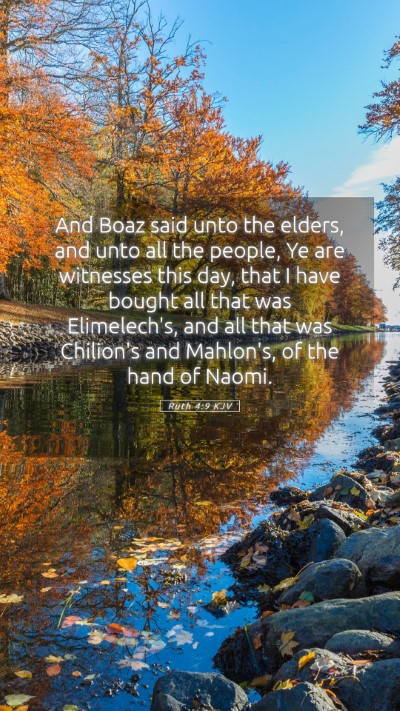Old Testament
Genesis Exodus Leviticus Numbers Deuteronomy Joshua Judges Ruth 1 Samuel 2 Samuel 1 Kings 2 Kings 1 Chronicles 2 Chronicles Ezra Nehemiah Esther Job Psalms Proverbs Ecclesiastes Song of Solomon Isaiah Jeremiah Lamentations Ezekiel Daniel Hosea Joel Amos Obadiah Jonah Micah Nahum Habakkuk Zephaniah Haggai Zechariah MalachiRuth 4:9 Meaning
What is the meaning of Ruth 4:9?
And Boaz said unto the elders, and unto all the people, Ye are witnesses this day, that I have bought all that was Elimelech's, and all that was Chilion's and Mahlon's, of the hand of Naomi.
Ruth 4:9 Bible Verse Meaning
Bible Verse Meaning: Ruth 4:9
Ruth 4:9: "And Boaz said unto the elders, and unto all the people, Ye are witnesses this day, that I have bought all that was Elimelech's, and all that was Chilion's and Mahlon's, of the hand of Naomi."
Insights from Public Domain Commentaries
Matthew Henry's Commentary
Matthew Henry emphasizes the importance of the act Boaz is performing, as he publicly declares his legal right to redeem the land of Naomi's deceased husband and sons. This action is not merely a business transaction, but it symbolizes a deeper responsibility to preserve the lineage of Elimelech. Henry notes that Boaz's commitment is solemn and serves the community by reinforcing the principles of family and inheritance as outlined in the Mosaic Law.
Albert Barnes' Commentary
Albert Barnes highlights the gravity of Boaz's words as he presents himself before the elders and witnesses of the town. He sees this moment as essential in ensuring that the rights of the widow, Naomi, are respected. Barnes discusses the cultural backdrop of redemption—where a kinsman redeemer plays a crucial role in protecting and supporting the family line. This is not merely a purchase; it is an assertion of family duty and an act of faithfulness to God’s commands regarding property and family ties.
Adam Clarke's Commentary
Adam Clarke reflects on the significance of witness in community life. He posits that Boaz’s action in openly discussing his redemption of Naomi’s land serves to establish a credible witness to the transaction. Clarke elucidates the thirteenth chapter of Deuteronomy, which outlines public testimony in various transactions. This verse not only signifies a legal act but also portrays a spiritual significance, showing how God’s providence leads to the restoration of Naomi's family and lineage through Ruth and Boaz's marriage.
Biblical Context and Significance
Ruth 4:9 encapsulates pivotal themes in the Book of Ruth, including redemption, loyalty, and family preservation. Boaz's statement reinforces the kinship responsibilities mandated in the Israelite community, emphasizing how the law aimed at safeguarding the identity and continuity of families amid Israel’s unfolding history. This moment is also profoundly theological; the redemption by Boaz points forward to Christ’s redemptive work for humanity.
Application and Understanding
This verse prompts deep reflections for readers today on the nature of commitment to family and community. Just as Boaz stepped up to fulfil his obligations, believers are called to uphold the values of loyalty and responsibility within their communities. Additionally, understanding the legal and cultural backdrop of Boaz’s actions encourages readers to delve into the cultural contexts of scripture, providing richer insights into Biblical applications in modern life.
Related Bible Cross References
- Leviticus 25:25: The laws concerning the redemption of property.
- Deuteronomy 25:5-10: Instructions on brother-in-law marriage and the duty to produce offspring for a deceased relative.
- Matthew 1:5: The genealogy of Jesus, highlighting Boaz and Ruth's significance in the lineage of Christ.
Conclusion
This exploration of Ruth 4:9 invites readers to engage with the scripture through the lens of community responsibility and divine providence. The insights from notable commentaries enhance our understanding of the biblical text and its implications for modern life. As believers learn to interpret Bible verses effectively, such insights become invaluable in Bible study groups and online Bible study resources aimed at fostering deeper scriptural insights.


